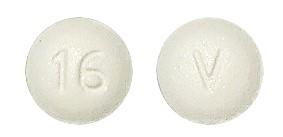Zafirlukast Dosage
Medically reviewed by Drugs.com. Last updated on Jun 2, 2025.
Applies to the following strengths: 10 mg; 20 mg
Usual Adult Dose for:
Usual Pediatric Dose for:
Additional dosage information:
Usual Adult Dose for Asthma - Maintenance
- 20 mg orally twice a day, 1 hour before or 2 hours after meals
Comments:
- A dose of 20 mg twice daily was not associated with an increase in the overall incidence of adverse events or withdrawals in elderly patients.
Use: Prophylaxis and chronic treatment of asthma
Usual Pediatric Dose for Asthma - Maintenance
Less than 5 years: The safety and effectiveness has not been established.
5 to 11 years:
- 10 mg orally twice a day, 1 hour before or 2 hours after meals
12 years or older:
- 20 mg orally twice a day, 1 hour before or 2 hours after meals
Use: Prophylaxis and chronic treatment of asthma
Renal Dose Adjustments
No adjustment recommended.
Liver Dose Adjustments
Hepatic impairment including cirrhosis: Contraindicated
This drug has not been evaluated in patients with hepatitis or in long-term studies of patients with cirrhosis.
Precautions
Safety and efficacy have not been established in patients younger than 5 years.
Consult WARNINGS section for additional precautions.
Dialysis
No data available
Other Comments
Administration advice:
- This drug should be taken at least 1 hour before or 2 hours after meals.
- Ongoing clinical assessment, including diagnostic evaluations and treatment is recommended.
Storage requirements:
- Store at controlled room temperature, 20C to 25C (68F to 77F).
- Protect from light and moisture.
General:
- This drug is not a bronchodilator and should not be used to treat acute episodes of asthma.
Patient advice:
- Report immediately any symptoms of hepatic dysfunction (e.g., right upper quadrant abdominal pain, nausea, fatigue, lethargy, pruritus, jaundice, flu-like symptoms, and anorexia).
- This drug is indicated for the chronic treatment of asthma and should be taken regularly as prescribed, even during symptom-free periods.
- Patients should not decrease the dose of this drug or stop taking any other antiasthma medications unless instructed by a physician.
- Notify the physician if neuropsychiatric events occur while using this drug.
More about zafirlukast
- Check interactions
- Compare alternatives
- Pricing & coupons
- Reviews (7)
- Drug images
- Side effects
- During pregnancy
- Drug class: leukotriene modifiers
- Breastfeeding
- En español
Patient resources
Other brands
Professional resources
Other brands
Related treatment guides
See also:
Further information
Always consult your healthcare provider to ensure the information displayed on this page applies to your personal circumstances.


